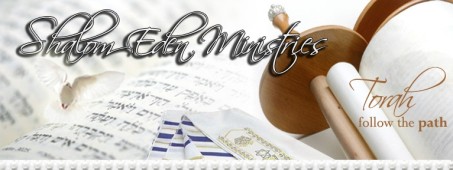BIBLE STUDY LESSON 13
JEALOUSY
SHIBBOLETH OR SIBBOLETH
From Judges 12:1-15
“The men of Ephraim were very angry with Jephthah. They formed an army at Zaphon and went to fight him. ‘We’re going to shut you in your house and burn it down,’ they said. ‘You went to fight the Ammonites without asking us to go with you.’ ‘I did ask you!’ said Jephthah. ‘But you wouldn’t help us Gileadites. So I risked my life against them and the Lord gave me a great victory. Why do you want to fight me?’ Jephthah went out to fight the men of Ephraim because they had accused the Gileadites of being foreigners in their midst. His forces captured the fords of the Jordan behind the army of Ephraim and then attacked from the front. Whenever a fugitive from the army of Ephraim tried to cross the river, the soldiers of Gilead stationed there captured him. ‘Are you a member of the tribe of Ephraim?’ they asked. If he said ‘no’ they made him say ‘shibboleth.’ If the man said ‘sibboleth,’ they knew he was from the tribe of Ephraim and killed him there at the fords of the Jordan. Forty-two thousand Ephraimites died in this battle. Jephthah was judge over Israel for six years. When he died, he was buried in Gilead. Ibzan of Bethlehem followed Jephthah as judge. He had thirty sons who married girls outside his tribe and thirty daughters who also married outside his tribe. For seven years he judged Israel; then he died and was buried at Bethlehem. Elon of Zebulun was the next judge. He ruled for ten years before he died and was buried at Aijalon in Zebulun. Abdon, son of Himel, from Pirathon, followed as Israel’s third judge after Jephthah. He had forty sons and thirty grandsons, who rode about on seventy donkeys. After he had ruled for eight years, he died and was buried at Pirathon in the land of Ephraim in the hill country of the Amalekites.
COMMENTARY
CANAANITE LANGUAGE AND WRITING
After God gave Jephthah and Israel a victory over the Midianites, it would seem that the people should praise the Lord. But the men of the tribe of Ephraim were jealous and angry. Victory did not lead to joy, but to civil war! Forty-two thousand men died because of a foolish quarrel. The alphabet used in the English language has its origins in Greece. But the Greeks only refined an alphabet found in Canaan. The Canaanite alphabet is the first known to history; it was created more than a thousand years before Greek traders carried it to the rest of the world. Before the alphabet, the Canaanites used a system of writing from Mesopotamia called cuneiform. It involved over six hundred symbols, one for every syllable and grammatical mark in the language. Over several hundred years the Canaanites tried many simpler ways of writing. They had great difficulty creating an easily usable system because, though they could understand each other, each group in Canaan spoke the language a little differently; each had a different dialect. The people of Ugarit invented a script that used thirty cuneiform signs to represent the individual sounds of their speech instead of syllables. The merchants of Byblos developed a set of seventy-five cuneiform symbols based on syllables for their dialect. But finally the Canaanites borrowed part of the system used by the Egyptians, their neighbours to the south. The Egyptians wrote with complex picture-symbols called hieroglyphics. Taking the idea of hieroglyphics, the Canaanites used it in an entirely new way. They did not use the hieroglyphics as little picture-symbols for things, nor did they use them to represent syllables. Instead, the Canaanites used them to indicate individual letters or sounds. They finally settled on twenty-seven different symbols. These symbols became the letters of the very first true alphabet in history. It formed the basis of the alphabet used throughout the Western world today.
TEST YOURSELF
1.) Where did the men of Ephraim gather to fight Jephthah?
A) Zaphon
B) Bethlehem
C) Pirathon
D) Gilead
2.) Why were the men of Ephraim mad at Jephthah?
A) They wanted to avenge the death of Jephthah’s daughter
B) They claimed that Jephthah hadn’t ask for their help to fight the Ammonites
C) They wanted Jephthah’s land
D) They claim Jephthah has cheated them out of the Ammonites plunder.
3.) What word did Jephthah’s men use to find out if a fugitive was from Ephraim or not?
A) “Shibboleth”
B) “Homunculus”
C) “Akbaba”
D) “Refrigerator”
4.) How long did Jephthah rule over Israel as judge?
A) Five days
B) Ten years
C) Six years
D) Seven months
5.) Where was Ibzan from?
A) Pirathon
B) Bethlehem
C) Gilead
D) Zaphon
6.) What tribe was Aijalon from?
A) Ephraim
B) Levi
C) Judah
D) Zebulun
7.) Where was Abdon buried?
A) Pirathon
B) Gilead
C) Bethlehem
D) Zaphon
8.) Where did the English Alphabet originate?
A) It was derived from cuneiform symbols
B) It evolved out of the Greek alphabet
C) Monkeys drew it in the sand
D) None of the above
9.) How many symbols did the merchants of Byblos use in their cuneiform?
A) 13
B) 32
C) 75
D) 47
10) How many letters did the Canaanite alphabet had?
A) 27
B) 23
C) 33
D) 5 |
